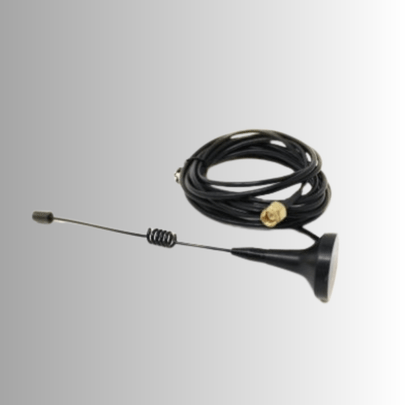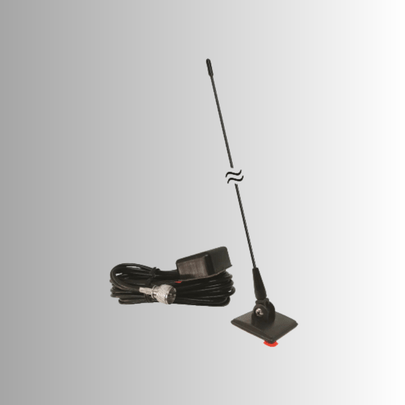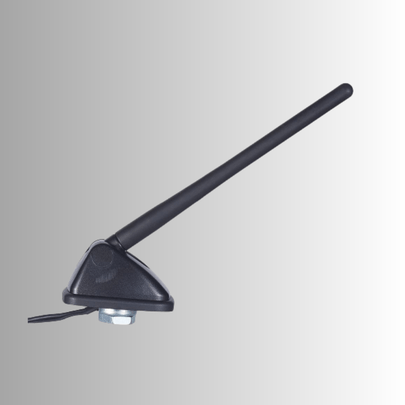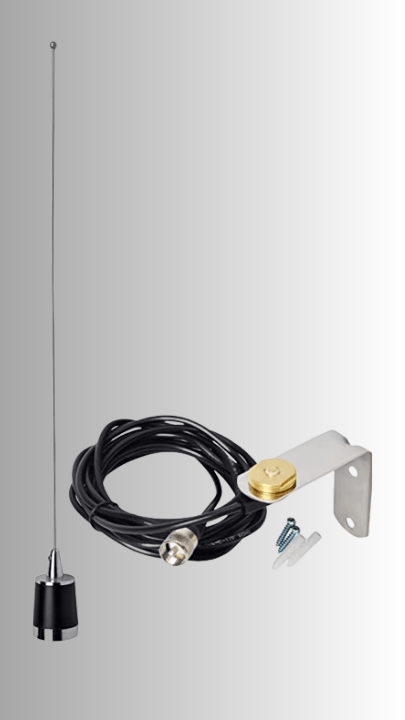Mobile ham radio antenna, as the name itself suggests is the antenna for your ham radio setup which provides you the flexibility of getting “mobile” while using your ham radio.
Depending on the purpose you use your ham radio for; you may be required to choose a static i.e. a fixed or a mobile antenna that you can fix on your car, truck or other vehicle.
WHAT IS MOBILE HAM RADIO ANTENNA?
Technically An antenna is a metallic device which works as a conductor of electrical waves. It transmits and receives radio signals in form of EMW (Electro Magnetic Waves), which ultimately determines the range and quality of your communication.
Similarly A mobile ham radio antenna can be simply defined as a device that acts as an interface between your radio equipment and the outside world while you are mobile. Its small size and fixture build allows it to be installed on a car, truck, boat or other mobile platform. It will allow two amateur radio operator to establish communication while on the go.
TYPES OF MOBILE HAM RADIO ANTENNA:
Magnetic Mount Antennas
Magnetic mount antennas are a popular choice among mobile ham radio operators due to their convenience and versatility.

These tiny antennas come with a magnetic base. So it is easy to install on any metal surface whether it be roof, truck, car or any other metal surface. Performance wise they are decent. Its performance however can be deteriorated by nearby metal objects. So placing it in right spot is important.
Glass Mount Antennas
Glass mount antenna is an alternative option for mobile installations.

These antennas are designed to be mounted on the window or windshield of your vehicle, utilizing adhesive pads for secure attachment. Glass mount antennas offer good performance and are less affected by nearby metal objects compared to magnetic mount antennas. However, their signal range may be slightly limited due to the glass acting as a barrier.
Roof Mount Antennas
For maximum performance and range, roof mount antennas are the best choice. These antennas are permanently installed on the roof of your vehicle mechanically providing excellent signal coverage.

Roof mount antennas are typically larger in size and offer higher mechanical stability, superior gain and efficiency compared to other types. They are often used by avid ham radio enthusiasts and professionals who require long-range communication capabilities. Keep in mind that roof mount antennas require more complex installation and may not be suitable for all vehicles.
HOW TO CHOOSE MOBILE HAM RADIO ANTENNA?
With so many options available for mobile ham radio antenna in market these days, It may be tricky to choose right antenna for your setup.
Following points may be taken under consideration for choosing correct mobile antenna:
Type of Vehicle you are using
Choice of mobile antenna will highly depend upon vehicle you’re using it on. If you have a small car, the height of the antenna shall be considered so that it can provide sufficient coverage. On the other hand if you intend to use it on a larger vehicle i.e. a truck or a SUV, smaller height is recommended. All n all do consider your vehicle’s strength and capacities before buying any antenna.
Frequency Range
The frequency range supported by the antenna is an essential specification to go through in the product brochure or the guide.
Ensure that the antenna you choose covers the ham radio bands you are licensed to operate on. Ham radio bands vary across different regions, so familiarize yourself with the frequency allocations in your country. Opting for a wideband antenna can provide flexibility to operate on multiple bands.
Gain of the Antenna
The gain of an antenna can simply understood as it’s ability to converge the radio energy in a specific direction. Higher the gain; longer the distance of will be covered by antenna to transmit and receive signals.
However, keep in mind that high gain antennas are more directional, meaning they have a narrower coverage area. Consider your communication needs and choose an antenna with an appropriate gain value.
Size & Portability
When selecting a mobile ham radio antenna, consider the size and portability aspects. Magnetic mount and glass mount antennas are generally compact and easily removable, making them suitable for frequent travelers. Roof mount antennas, on the other hand, are larger and more permanent. Assess your mobility requirements and choose an antenna that aligns with your needs.
Mounting Options
Evaluate the available mounting options for your vehicle to ensure compatibility with the chosen antenna. Different vehicles may have specific mounting limitations or requirements.
Magnetic mount antennas are versatile and can be easily moved between vehicles, while glass mount antennas offer a discreet installation option. Roof mount antennas, although more complex to install, provide superior performance and range.
Build Quality
Considering the conditions in which mobile ham radio antennas are exposed, it is essential to choose an antenna with excellent build quality and durability.
Look for antennas constructed with high-quality materials that can withstand harsh weather conditions and frequent use. A robust antenna will ensure reliable performance and longevity.
SWR & Tunning
Standing Wave Ratio (SWR) is a critical factor in antenna performance. A low SWR indicates efficient power transfer between the antenna and the radio, resulting in better signal transmission.
Some antennas may require tuning to achieve the desired SWR. Consider antennas with built-in tuning capabilities or ones that are easy to adjust for optimal performance.
Compatibility with Radio eqipment
The radio you use whether portable, handheld or fixed; It will have a connector where you are going to connect your antenna. It is important to ensure that the connection option given on the antenna you choose is compatible with the radio you are using e.g. BNC, PL-259 etc. Incompatibility will lead you to poor signal or lost signals.
If necessary, Use connecting adaptors for interconnecting different kind of connectors as a bridge.
HOW TO INSTALL MOBILE HAM RADIO ANTENNA?
Installation of mobile ham radio antenna is also an important part for getting optimum results.
After finding suitable location on your vehicle’s roof, I suggest you mark the location with a marker.
Then attach the antenna with the roof with options available with the model you have chosen. This can be done by drilling a hole in the vehicle’s surface and attaching the antenna with a bracket or by attaching the antenna directly to the vehicle’s surface with adhesive or it may directly stick to the surface if it is magnetic mount antenna.
Make sure all the connectors are tightly attached. Loose connection may lead to interference.
RECOMMENDED MOBILE HAM RADIO ANTENNA:
Here is the recommendation:
- HYS Amateur Antennas Dual-Band NMO 20 Inch Antenna
- VHF 144/UHF 430MHz NMO L Shape Mount Mobile Antenna
- Bracket W/13 ft RG58 Coax Cable NMO to UHF-male/PL259 for Motorola Kenwood Midland Mobile Radios

SOME OTHER MODELS TO CONSIDER (Updated 2025):
MOBILE HAM RADIO ANTENNA: CONCLUSION
Selecting the right mobile ham radio antenna is a crucial step in building an efficient and reliable mobile ham radio setup. Consider factors such as frequency range, gain, size and portability, mounting options, build quality, SWR and tuning, compatibility, and user reviews. Additionally, optimize and maintain your antenna regularly to ensure optimal performance.
Finally, it’s beneficial to research customer reviews and seek recommendations from fellow ham radio operators. Real-world experiences can provide valuable information beyond technical specifications. Consider reputable brands with a track record of delivering high-quality antennas. Hearing from others who have used a particular antenna can give you insights into its performance, reliability, and overall satisfaction.
Invest time and effort in selecting the right mobile ham radio antenna, and you’ll be able to get improved signal strength, expanded coverage area, and enhanced overall performance. Happy ham radio operating!
Other blog posts from the category:




